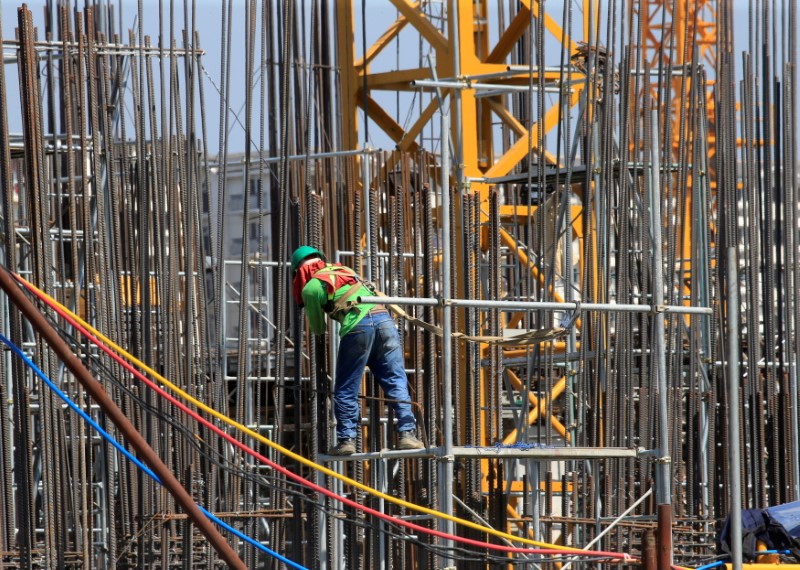By Manolo Serapio Jr
MANILA (Reuters) - China banned induction furnaces last year in a crackdown on polluting producers of low-quality steel, but these machines have made their way to parts of Southeast Asia, hitting domestic steelmakers and fuelling safety and environmental concerns.
The Philippines and Indonesia have seen an influx of these furnaces since China prohibited their use for steelmaking in June 2017, eliminating 140 million tonnes of capacity - or just over the combined output of the United States and Germany.
The two Southeast Asian nations - big steel importers with fast-growing economies - are ideal markets for these induction furnaces, or IFs, that produce cheaper steel.
But some big Indonesian and Philippines steelmakers claim that IF-produced steel does not meet national quality standards and poses a major risk in these countries that are prone to earthquakes and typhoons. They have urged their governments to ban IFs.
Unlike electric arc furnaces, IFs have limited or no capacity to remove impurities in the process of producing steel, resulting in inconsistent product quality. Since most IFs in the two countries produce rebar, which is used in construction, rival steelmakers say that poses safety hazards.
In the Philippines, "the rebar market is under attack from IF producers" which sell the product 20 percent cheaper than those from electric arc furnaces, said Roberto Cola, president of the Philippine Iron and Steel Institute.
In Indonesia, after China banned IFs, the furnaces were imported by factories to reduce steelmaking costs at the expense of safety, said Silmy Karim, chief executive of top Indonesian steelmaker Krakatau Steel (JK:KRAS).
"Imagine, Indonesia is an epicentre for earthquakes, so we must be vigilant. They must be prohibited," said Karim who is also chairman of the Indonesian Iron and Steel Association.
'WHOEVER WANTS TO BUY'
In banning IFs, China was also addressing the overcapacity that has dogged its steel sector for years. It hasn't stopped the sale of these machines to buyers outside China, mostly sold as second-hand equipment.
A trader based in top Chinese steel-producing city Tangshan buys and sells IFs with capacity of between 0.25 to 60 tonnes to, he says, "whoever wants to buy."
"I can also send it to overseas buyers as long as their country is okay with importing second-hand equipment," said the trader who spoke on condition of anonymity, adding there are container companies that process the shipping.
Another Tangshan-based trader said many of these machines are shipped to Southeast Asian nations such as Indonesia and Cambodia, most of them exported as parts and then assembled at the final destination.
The Association of Southeast Asian Nations (ASEAN) Iron and Steel Council urged member governments in January to prohibit the imports of Chinese IFs for use in steelmaking, saying the region has become a preferred destination for the "obsolete and unwanted equipment from China."
"If it's an ASEAN directive, all governments are inclined to comply," said Trade Undersecretary Ruth Castelo from the Philippines, whose government has launched an investigation of IFs that is currently underway and is expected be completed in the first quarter of 2019.
The total capacity of IFs in the Philippines has surged to 400,000-500,000 tonnes from 150,000-200,000 tonnes two years ago, said Cola, who is also vice president of leading Philippine steelmaker Steel Asia Manufacturing Corp. In Indonesia, 30-40 percent of domestic rebar producers use IFs, said Karim of Krakatau Steel.
Elsewhere in the region, Vietnam has not seen any movement of IFs from China since the latter banned the furnaces in 2017, said Chu Duc Khai, vice chairman of the Vietnam Steel Association, adding that the government is not allowing new investment in IFs.
There are also no new IF investments in Thailand with the rebar market there facing overcapacity, making it unattractive for new entrants, said Wikrom Vajragupta, chairman of the Thailand Iron and Steel Industry Club.
Karim, in Indonesia, said he wrote to Jakarta's environment ministry last month to draw attention to companies using IFs, but has yet to receive a response. Indonesia's environment and industry ministries did not respond to repeated requests for comment by Reuters.
Authorities had to shut some plants using IFs in the Philippines for violating environmental laws, but allowed them to resume operations after they complied, Environment Undersecretary Benny Antiporda said.
Castelo, the Philippine trade official, said she visited three steel plants using IFs and found them either lacking or without anti-pollution devices.
"It's not safe even for the workers and for the neighbouring areas," said Castelo.

"(But) we cannot just ban it without justification so we have to go through due process," she said, referring to the investigation into IFs.